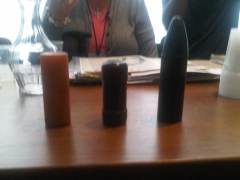Help the UK's Wrongly Convicted Tuesday in London
|
CD cover of Rapper Goddaz
has Jordan Cunliffe's picture above the letter A. Goddaz will be
joined by Alabama 3 and others to be announced for the special 26 June
event.
|
Paddy Hill photo: GuardianUK
|
| “ |
Myself and Paddy Hill (one of the Birmingham Six who
was released on Appeal after 16 long years in prison) are guest
speakers. We are hoping to raise money for the JENGbA Campaign as well
as raising awareness to the abuse of the law of Joint Enterprise and the
horror of being a Miscarriage of Justice as Paddy Hill was and my son
Jordan Cunliffe's now is.
|
” |
"They have nothing in their whole imperial arsenal that can break the spirit of one Irishman who doesn't want to be broken"
- Bobby Sands |
| “ |
If IRA members had carried-out such attacks, they would
be court-martialled and could face the death penalty. The IRA has clear
guidelines for waging its war. Any attack on non-military installations
must be preceded by a 30-minute warning so that no innocent civilians
are endangered.
|
” |
Mulberry Bush Pub bombing: justice4the21.blogspot.com
|
The Birmingham Six on the day of their release with
Chris Mullin MP (centre) Courtesy: innocent.org.uk |
15-year old Jordan Cunliffe
|
- For years, he has suffered from acute
keratoconus, an eye condition. A medical report produced at the trial
stated: "He is eligible to be registered as a blind person and is unable
to perform any tasks for which vision is necessary." The report was
accepted by the prosecution and read to the jury.
Janet Cunliffe rallying for her son Jordan.
|
- Newlove, who supports capital punishment – she
told reporters in 2008 that the UK should have the death penalty –
believes the trio convicted of killing her husband should never be
released from prison.
| “ |
Baroness Newlove, the victim's wife, continually
appears in the media saying her husband was kicked in the head forty
times and that my son stood and watched while this happened. This simply
is not true.
Garry Newlove died due to a single blow to the neck and
this was inflicted by one person. As Jordan wore no shoes and had no
marks to his hands or his feet, this proves he played no part in any
attack, and more importantly as Jordan was blind, to stand and watch as
Baroness Newlove claims is something he most certainly could not do.
|
” |
Jordan Cunliffe, who is legally blind, was
sent to life in prison at 15 for standing near a crime that took place, even though he had nothing to do with it. |
| “ |
If a blind 15-year old child can can slip through the
net then this can happen to absolutely anyone. People need to start
realising just how vulnerable they are if this law stays as it is.
People need to show their support and speak out, no one should be made
to take responsibility for someone elses actions, especially if they if
they have no knowledge of that other persons actions, and the public
need to do this now so that this does not have to happen to them or
anyone else.
|
” |
supporting prisoners who have been convicted under joint enterprise but who are not
guilty of the index offence. We are all volunteers who have a loved one in prison for
something they did not do. We are campaigning to highlight the abuse of "joint
enterprise" to convict innocent people, including children, who are serving
mandatory LIFE sentences.What is JOINT ENTERPRISE?
Joint Enterprise is an archaic doctrine that was introduced hundreds of
years ago to outlaw duelling. It means anyone associated with someone who
commits a crime can be convicted alongside them for the same offence.PLEASE SUPPORT US – see our website www.jointenterprise.coOr come along to our fundraiser in London on Tuesday 26th











